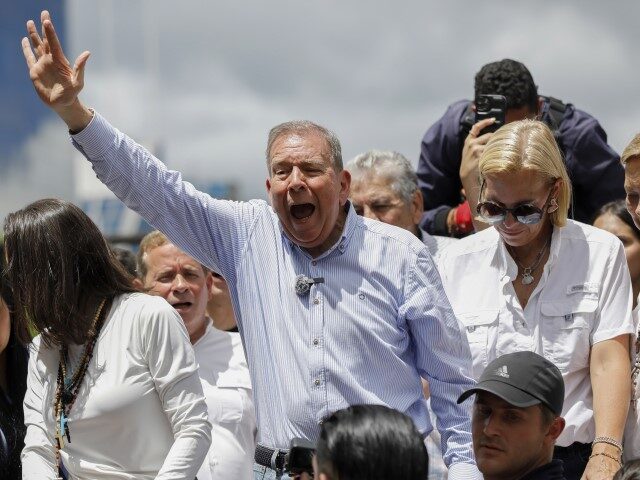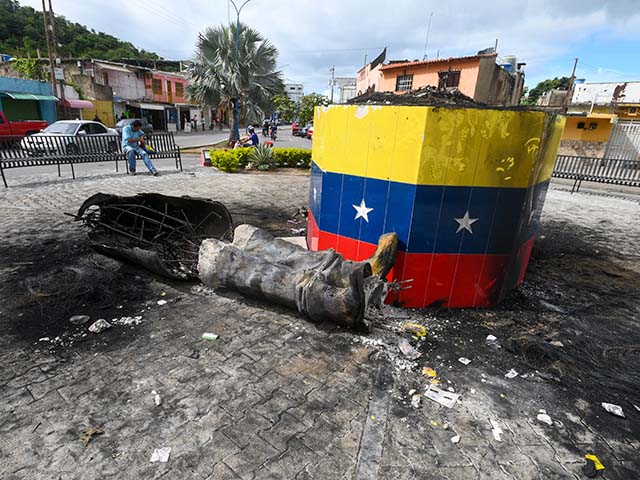Peru Recognizes Maduro Rival as President-Elect of Venezuela
 Cristian Hernandez/AP
Cristian Hernandez/AP
The government of Peru announced on Tuesday that it is recognizing 74-year-old former diplomat Edmundo González as the president-elect of Venezuela following Sunday’s sham presidential election, which socialist dictator Nicolás Maduro claims he won.
Peru’s Foreign Minister Javier González-Olaechea told the local radio station RPP that the official stance of the Peruvian government is to recognize González as the president-elect of Venezuela.
“It is evident that the will to fraud exists. More or less from an initial count on Sunday they were already on the screens [and] the difference was more than 30 points in favor of Mr. Gonzalez, which was irreversible. And Mr. González is the president-elect of Venezuela,” González-Olaechea told RPP.
The Peruvian foreign minister said that the government of Peru does not rule out considering the Maduro regime a “de facto government” in January 2025, when the next six-year presidential term is slated to begin in Venezuela.
“Until his term ends he is a president … and at the end of the term he would become a de facto government,” he said.
González-Olaechea also told the state-owned TV Perú channel that Peru’s opinion that González is the president-elect is “shared by numerous countries, governments and international organizations.”
The Peruvian government’s announcement echoes the events that took place in Venezuela in 2019 following a similar sham election, in which much of the Western world refused to acknowledge Maduro’s claim to victory and instead proclaimed former National Assembly leader Juan Guaidó the president of the country. Constitutionally, Guaidó became the president due to a “rupture in the democratic order.” Despite being the legitimate president of Venezuela and having the international recognition of some 50 countries, Guaidó failed to oust Maduro or exercise any meaningful authority during his term, leading to the dissolution of his presidency in late 2022 and Guaidó’s eventual exile to Florida in 2023.
Venezuela is experiencing a new political crisis and wave of protests against the socialist Maduro regime in the aftermath of July 28’s sham presidential election. The “election” was marked by a large list of actions taken by the ruling socialists to ensure that the event was far from being free or fair — down to its date, as it marked the 70th birthday of late socialist dictator Hugo Chávez, who died in 2013.

A destroyed statue of the late Venezuelan President Hugo Chavez lies next to its base in Valencia, Venezuela, Tuesday, July 31, 2024, the day after people protested the official election results that certified Chavez’s protege, current President Nicolas Maduro, as the winner. (Jacinto Oliveros/AP)
The sham election saw Maduro “run” against eight handpicked “opposition” rivals and González, the only legitimate opposition candidate on the ballot. Maduro appeared 13 times on the ballot.
Venezuela’s National Electoral Center (CNE) announced early Monday — shortly after midnight of election day — that Maduro had “won” the sham election after receiving 51 percent of the vote. CNE then moved on to hastily certify Maduro’s “victory” on Tuesday even though the electoral council — at the service of the ruling socialists — has yet to publish any kind of finalized results at press time.
The Venezuelan opposition has aggressively contested the results. Opposition leader María Corina Machado — who was not allowed to run in the election despite being the winner of the opposition’s primary election — said on Monday that the opposition is in possession of verified vote tallies from Sunday’s sham election that can prove González won and Maduro is attempting to steal the election.
The situation has led to intense protests that the Maduro regime’s repressive apparatus responded to immediately with violence. Machado denounced on Wednesday morning that the Maduro regime’s repression has resulted in 16 deaths, 177 arbitrary detentions, and 11 cases of forced disappearances.
CNE’s failure to publish official finalized results has prompted the United States and several other countries to question the sham election and make calls for the Venezuelan authorities to conduct a transparent recount of the votes. Other countries such as Argentina and Chile have announced that they do not recognize Maduro’s victory as legitimate. Peru is, at press time, the only country recognizing González as president-elect.
The Maduro regime announced on Monday that it would cut off diplomatic ties with seven of the countries that have questioned the sham election: Argentina, Chile, Costa Rica, Peru, Panama, the Dominican Republic, and Uruguay.
Maduro has ruled Venezuela since 2013 after late socialist dictator Hugo Chávez appointed him his successor weeks before dying of an undisclosed form of cancer in March of that year. In 2018, Maduro held a fraudulent election that allowed him to cling to power for a second six-year term. Much like Sunday’s sham election, the 2018 election had Maduro “run” against a group of handpicked “opposition” rivals.
The fraudulent 2018 election was not recognized by much of the free world or by the then-opposition-led National Assembly, the last democratically elected institution in Venezuela. In light of Maduro’s refusal to step down at the end of his first term in January 2019, the National Assembly acted in accordance to what the Venezuelan constitution defines as “rupture in the democratic order” and designated Juan Guaidó, the head of the parliament at the time, Venezuela’s legitimate interim president.
Guaidó’s interim government vowed to oust Maduro’s illegitimate rule, establish a transitional government, and restore democracy in Venezuela by holding free elections. The interim government received the international recognition of the United States, Canada, the European Union, and 50 other countries.
Some of the countries that supported the interim government, such as the United States and the United Kingdom, granted it custody of Venezuela’s frozen overseas assets, preventing the socialist regime from using them to fund itself and its repressive actions against the Venezuelan people.
Despite the international support received, Guaidó’s government failed to exert any power in Venezuela and essentially remained as a symbolic institution throughout its existence. By 2020, most of Venezuela’s citizens had stopped having faith in Guaidó’s government after it repeatedly failed to produce results towards restoring democracy in the country.
The interim government was originally intended to have a short duration and last until free elections took place in the country. However, it failed to achieve any of its goals throughout the nearly three years that it lasted. Maduro was not ousted, no transitional government was formed, and no free elections took place in the country.
Guaidó’s presidency was dissolved in December 2022 after the opposition-led National Assembly voted to not renew his presidency for an additional year through a Zoom call riddled with technical issues. The dissolution of the interim government occurred two years after the Maduro regime ousted the opposition-led parliament and replaced its members with socialist lawmakers, forcing most of the opposition lawmakers to flee into exile.
Juan Guaidó now lives in exile in Florida, having moved there in April after Colombian authorities deported him to Miami following his attempts to hold meetings with international delegations attending a conference on Venezuela organized by Colombia’s radical leftist President Gustavo Petro at the time.
Christian K. Caruzo is a Venezuelan writer and documents life under socialism. You can follow him on Twitter here.
Source link

